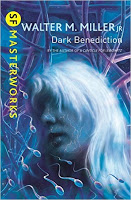All Things

- The End Of Science
Servers at LAAS by Guillaume Paumier Licensed under CC BY 3.0 via Wikimedia CommonsIn my previous article I wrote this: perhaps our scientific civilization won?t endure beyond this century. This is what I mean by the title of this article (the end of...
- The Horizon Effect
We are well aware of the horizon effect: as we walk towards the horizon, the horizon gets further away. In science sometimes this effect seems to apply. Let us look at a few examples:Mycoplasma genitalium genetic mapSynthetic biology: In 1960, producing...
- Predicting Social Future: Political Correctness
2001, A Space OdysseyAs I discussed in a previous post, scientists are often wrong when they predict the future of science. Science fiction writers make mistakes too, especially when they are trying to predict technical advances. Consider the film 2001,...
- Predicting The Scientific Future
Man likes making predictions of the future. Scientists are human beings, therefore they make predictions about the progress to be expected in various fields of research during the coming years, decades and even centuries. These predictions are widely...
- Science Is A Tool
Francis BaconThe utopia The New Atlantis, written by Francis Bacon, a contemporary of Galileo and pioneer of modern philosophy of science, describes a perfect society that would automatically arise from the practice of science, which the inhabitants of...
All Things
Dark benediction
 |
| Walter M. Miller Jr. |
Walter M. Miller Jr. was an American author of science fiction, known for a single book that has become a classic: A Canticle for Leibowitz, possibly one of the best science fiction novels of all time, at least among those in the apocalyptic sub-genre, which describes what might happen after a total nuclear war.
The novel is divided into three parts: In the first, Fiat Homo, the world is just beginning to recover from the disaster. As in the centuries following the fall of the Western Roman Empire, the Catholic Church takes the responsibility for saving what little remains of classical culture (ours) through the monks of an order founded by one man, Leibowitz, who before the nuclear conflagration was an electrical engineer. In the second part, Fiat Lux, several centuries have gone by, a new civilization has emerged and the world is entering a new Renaissance. In the third, Fiat Voluntas Tua, this civilization has reached its peak, materialism comes back, and history threatens to repeat itself. But this time Miller leaves a possible escape open: the colonization of the galaxy.

In addition to this novel, Miller wrote many short stories. One of them, published in 1951, Dark benediction, is very curious. It tells about the arrival on the Earth of some capsules of extraterrestrial origin, each of which contains a microorganism that infects humans and causes a strange disease that changes the color of their skin and affects their behavior, but does not end in death. The microorganisms are transmitted through direct physical contact and cause in the infected the intense desire to touch those who are free of the disease, thus ensuring that contagion will take place at the maximum possible speed.
The rapid spread of the disease caused the collapse of civilization. Scientific progress is stopped and communications stop working. People flee from cities and form armed gangs who kill infected people that have the misfortune to cross their way. Some of the infected take refuge in abandoned cities, where a few communities try to investigate their condition and find an explanation to what is happening.
What they discover is amazing: the extraterrestrial microorganisms are symbionts that enhance the nervous system of their hosts, provide them with new senses, and indirectly increase their intelligence. The aliens who sent them were not trying to destroy us, but to give us a gift. The capsules containing them carried a warning that was decrypted too late and read thus: Creatures who find this: if you kill your fellows, destroy this capsule without opening it. If you kill yourselves, this will only help you to destroy yourselves better.
The common thread of the novella is a love story between a normal man and an infectedgirl.
The common thread of the novella is a love story between a normal man and an infectedgirl.
In a discovery announced in May 2010, two American researchers reported that ingestion of the bacterium Mycobacterium vaccae seems to stimulate the growth of neurons in the brain and could increase our learning ability. Experiments with mice indicate that those who have ingested the bacteria learn to run mazes twice as fast as those who have not. If this is confirmed (I haven?t seen any confirmation in these five years), the scenario described by Miller could be possible. Let us hope that his predictions about the possible effects of the discovery on the future of our society will not come to be.
The same post in Spanish
Manuel Alfonseca
- The End Of Science
Servers at LAAS by Guillaume Paumier Licensed under CC BY 3.0 via Wikimedia CommonsIn my previous article I wrote this: perhaps our scientific civilization won?t endure beyond this century. This is what I mean by the title of this article (the end of...
- The Horizon Effect
We are well aware of the horizon effect: as we walk towards the horizon, the horizon gets further away. In science sometimes this effect seems to apply. Let us look at a few examples:Mycoplasma genitalium genetic mapSynthetic biology: In 1960, producing...
- Predicting Social Future: Political Correctness
2001, A Space OdysseyAs I discussed in a previous post, scientists are often wrong when they predict the future of science. Science fiction writers make mistakes too, especially when they are trying to predict technical advances. Consider the film 2001,...
- Predicting The Scientific Future
Man likes making predictions of the future. Scientists are human beings, therefore they make predictions about the progress to be expected in various fields of research during the coming years, decades and even centuries. These predictions are widely...
- Science Is A Tool
Francis BaconThe utopia The New Atlantis, written by Francis Bacon, a contemporary of Galileo and pioneer of modern philosophy of science, describes a perfect society that would automatically arise from the practice of science, which the inhabitants of...
